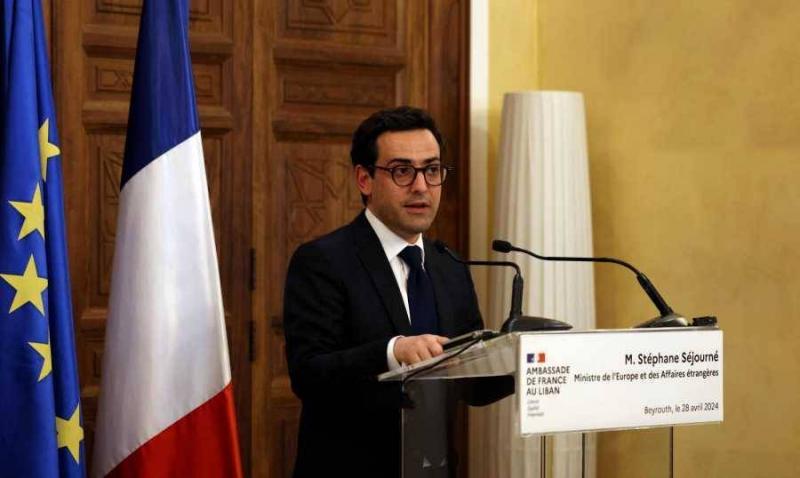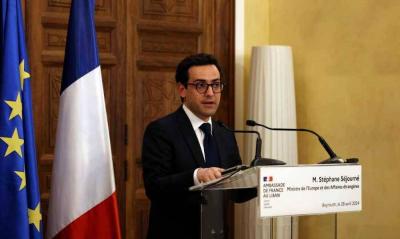Heightened alertness and anticipation dominate the scene, as everything hinges on the moment of response and how Tel Aviv deals with it. Armies are mobilized on land, at sea, and in the air, with missile platforms and drone launch bases awaiting the zero hour whistle that Tehran and Harf Hreik control. This is considering Tel Aviv’s potential to mix the cards again and launch a preemptive strike, according to "Al-Diyar."
As Lebanon and the world await Iran and Hezbollah's response, communications continue to avoid significant escalation in the region, occurring alongside the sound barrier being breached and Israeli warplanes flying at low altitudes over Beirut and the southern suburbs. This comes just before the appearance of Hezbollah's Secretary-General on the anniversary of the assassination of party leader Fouad Shukr, while the southern battlefield is ignited by the exchange of bombings and airstrikes between Hezbollah and Israel.
**International Communications**
These negative atmospheres have manifested on the ground, following leaks about a U.S. delegation's visit to Iran mediated by Oman. The developments of the last night included an escalation with the targeting of the Ain al-Asad base in Anbar, Iraq, particularly its American section, injuring several military personnel, according to Reuters. This suggests the collapse of all negotiations and ceasefire attempts, amid expectations of greater American involvement in operations due to the decision of the axis factions to escalate their operations against American bases in Syria and Iraq, at least for now. A statement from the White House confirmed that the National Security team informed Biden and Harris of the threats posed by Iran and its allies, noting that the President and Vice President discussed necessary steps to defend American forces and respond to any attacks targeting them.
On the Lebanese side, after a dual British delegation left Beirut pessimistically following Lebanon's rejection of proposals related to the implementation of resolution 1701 and Hezbollah's withdrawal behind the Litani River, London quickly took measures, raising its military readiness in the Eastern Mediterranean, sending a "considerable" naval group and evacuating the families of its diplomats residing in Lebanon. Meanwhile, the French foreign minister is also preparing, having been preceded by the Pine Palace in personal communications with nationals urging them to leave Lebanon.
In this context, information reveals that the team responsible for the Lebanon file in the Elysee serious studied the possibility of President Emmanuel Macron making a visit to Lebanon as a clear message to Israel. However, he later abandoned the idea for security reasons and advice received from several quarters, settling for sending the French caretaker government’s foreign minister, Stéphane Sigourney, in an attempt to contain escalation. Paris is aware that the situation has moved to a different phase, making it impossible to assume a role presently, especially in light of the United States retreating from playing a serious firefighter role at this stage, despite past considerations that a visit remained essential from a moral perspective, without altering the on-ground realities. Thus, no significant results are expected from the French guest's mission other than a message of solidarity with Lebanon, which rejects war, following that Sigourney, who hesitated in accepting the mission initially, carries a strongly-worded message, aligning with what officials heard from the British delegation, emphasizing the danger of military deterioration, as matters have now exceeded Lebanon and its arena on one hand, and reaffirming their support for the Lebanese people that they are not abandoned.
**Internal Communications**
This deteriorating situation and fears of the implications of what is to come prompted the caretaker government to activate its work and intensify its meetings on multiple fronts, focusing efforts on three paths. Firstly, diplomatically, with the president opening communication channels with external parties around the clock, hoping to achieve some breakthrough. Secondly, working to secure essential needs regarding food, fuel, and medical supplies, where the World Health Organization responded promptly, sending a large shipment of supplies necessary for hospitals in emergency and wartime, reassuring sources that there are no issues regarding medical supplies, with stocks in hospitals and companies sufficient for at least three to six months. The third aspect is security, amid fears of the situation spiraling out of control and opportunists, both Lebanese and Syrians, attempting to exploit the chaos that could stem from the situation, especially as recent days have seen a series of operations and events raising concerns about their escalation.
Information converged indicating that the U.S. military is ready to establish a sea bridge in the Jounieh area, aimed at evacuating foreign citizens and diplomats, as well as using it as a passage for essential supplies, with operations at the Port of Beirut and Rafic Hariri International Airport coming to a halt. Notably, all arrangements for this operation were prepared by the Cypriot side. Major countries have complained about the slowness of evacuation operations through Rafic Hariri International Airport, amid major airlines refraining from sending flights, while Middle East Airlines reduced the number of its planes in the airport to the extreme. Meanwhile, there are reports of black market mafias beginning to control the prices of flight tickets, selling them at inflated prices to foreign nationals wishing to leave, alongside difficulties finding any tickets through online platforms.
**Military Deployment**
Sources in this respect indicate that the American and British naval military deployment off the Lebanese coast is situated in the area extending from Beirut towards Tripoli in the north and includes amphibious groups, landing ships, and destroyers equipped with cruise missiles, in addition to an aircraft carrier accompanied by a helicopter carrier, featuring a floating hospital, supported by reconnaissance and electronic warfare aircraft that dominate the sky around the clock, conducting scanning and monitoring operations over the entire Lebanese and Syrian coastline, reaching into Syrian territory up to the Iraqi border.
**Israeli Strike**
Amidst this complex and bleak scene, diplomatic data indicated that Israel is ready to execute a preemptive operation, with its location determined in coordination with U.S. Central Command, in an effort to thwart the attrition strategy being employed by the resistance axis. It is known that the commander of Central Command, General Kurilla, who visited Tel Aviv and met with its top leaders before departing to his command operation room in Jordan, discussed with the Israelis the Lebanese front, setting red lines, including not targeting the Lebanese army, which Washington views as a critical strategic partner in the region and sees it as playing an active role in implementing any future settlement.
**Resistance Response**
For its part, according to statements from Hezbollah's Secretary-General Hassan Nasrallah, the southern front has resumed its role, expanding the scope of operations and the geographic range to include areas inside Israel that had remained untouched until yesterday, utilizing new weapons, including drones at night. This has baffled the Israeli army, which initially believed that Hezbollah lacked nighttime vision capabilities for its drones or even night photography cameras, a notion that was dismissed by the operations of recent hours, according to "Al-Diyar."




